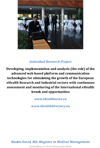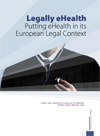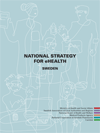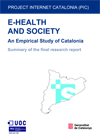Article of the Month!
 This research project is addressed to all eHealthNews.EU Portal readers interested in strengthening the European eHealth domain. The proposed publication is an open invitation for further collaboration in advancing the European eHealth Research and Industrial sectors. The main project topic is "Identification and analysis of the web based platforms and communication technologies role in stimulating the growth of the European eHealth Research and Industrial sectors with continuous monitoring of the International eHealth trends and opportunities".
This research project is addressed to all eHealthNews.EU Portal readers interested in strengthening the European eHealth domain. The proposed publication is an open invitation for further collaboration in advancing the European eHealth Research and Industrial sectors. The main project topic is "Identification and analysis of the web based platforms and communication technologies role in stimulating the growth of the European eHealth Research and Industrial sectors with continuous monitoring of the International eHealth trends and opportunities".
 The term eHealth, although now quite current in Europe and, indeed, throughout the world, still is rather new, making its first appearances in the scientific and policy literature around 1999. Its predecessors, however, date back to the 1960s when the concepts of health informatics and bio-medical computing began to occupy the minds of academic physicists, mathematicians, and medics.
The term eHealth, although now quite current in Europe and, indeed, throughout the world, still is rather new, making its first appearances in the scientific and policy literature around 1999. Its predecessors, however, date back to the 1960s when the concepts of health informatics and bio-medical computing began to occupy the minds of academic physicists, mathematicians, and medics.  This research project is addressed to all eHealthNews.EU Portal readers interested in strengthening the European eHealth domain. The proposed publication is an open invitation for further collaboration in advancing the European eHealth Research and Industrial sectors. The main project topic is "Identification and analysis of the web based platforms and communication technologies role in stimulating the growth of the European eHealth Research and Industrial sectors with continuous monitoring of the International eHealth trends and opportunities".
This research project is addressed to all eHealthNews.EU Portal readers interested in strengthening the European eHealth domain. The proposed publication is an open invitation for further collaboration in advancing the European eHealth Research and Industrial sectors. The main project topic is "Identification and analysis of the web based platforms and communication technologies role in stimulating the growth of the European eHealth Research and Industrial sectors with continuous monitoring of the International eHealth trends and opportunities".  This particular consultation workshop is the second of its kind concerning the area of Personal Health Systems (PHS) in the 7th Framework Programme (FP7). The first event was organised in Luzern in February 2006 and provided inputs for the ICT WP of 2007-08. The objective of the current workshop in Tampere was to gather inputs for the ICT WP in the period 2009-2010, as far as the PHS research is concerned.
This particular consultation workshop is the second of its kind concerning the area of Personal Health Systems (PHS) in the 7th Framework Programme (FP7). The first event was organised in Luzern in February 2006 and provided inputs for the ICT WP of 2007-08. The objective of the current workshop in Tampere was to gather inputs for the ICT WP in the period 2009-2010, as far as the PHS research is concerned.  Information and communication technologies (ICT) offer numerous potential benefits in terms of improvements for patients, health and elderly care professionals and decision-makers. Citizens, patients and relatives must have quick, trouble-free access to quality-assured information on health care provision and health concerns, as well as personal data on their own care, treatment and health status. They must also be able to contact care services via the internet for assistance, advice or help with self-treatment.
Information and communication technologies (ICT) offer numerous potential benefits in terms of improvements for patients, health and elderly care professionals and decision-makers. Citizens, patients and relatives must have quick, trouble-free access to quality-assured information on health care provision and health concerns, as well as personal data on their own care, treatment and health status. They must also be able to contact care services via the internet for assistance, advice or help with self-treatment.  This study analyzed the interaction between organizational change, cultural values and technological change in the Catalan health system. The study is subdivided in five distinct parts. The first one is a content analysis of the webs related to health in Catalonia. The second is a study of the uses of Internet in health related issues among the population at large, the patients associations, and the health professionals, on the basis of an Internet survey adapted to each one of these groups.
This study analyzed the interaction between organizational change, cultural values and technological change in the Catalan health system. The study is subdivided in five distinct parts. The first one is a content analysis of the webs related to health in Catalonia. The second is a study of the uses of Internet in health related issues among the population at large, the patients associations, and the health professionals, on the basis of an Internet survey adapted to each one of these groups.